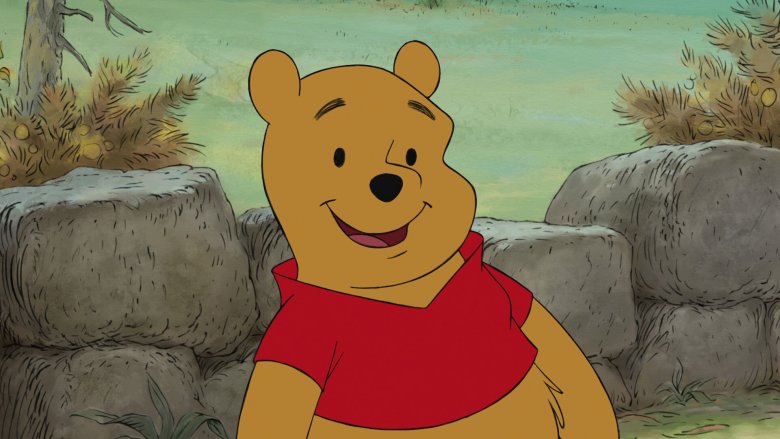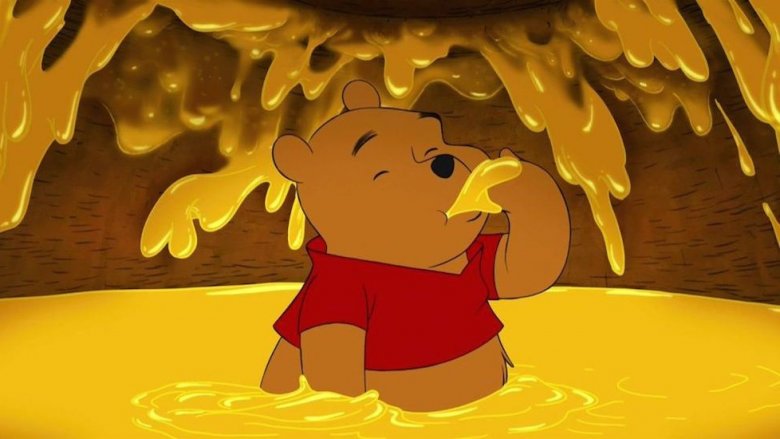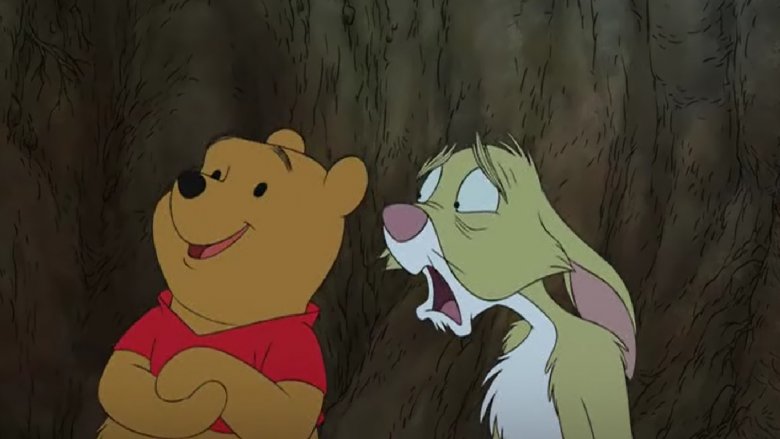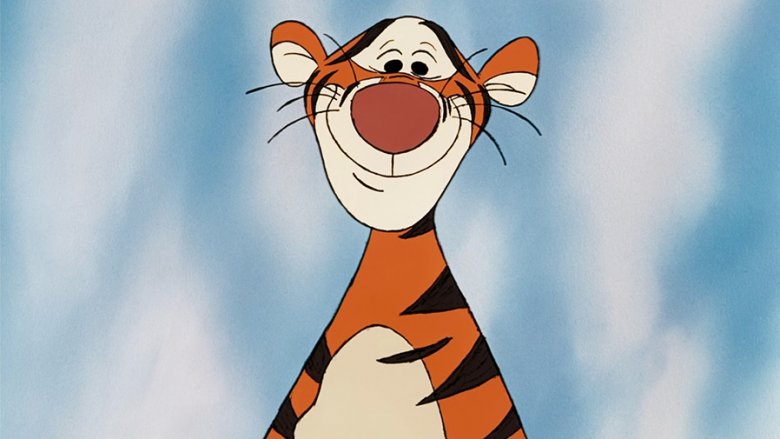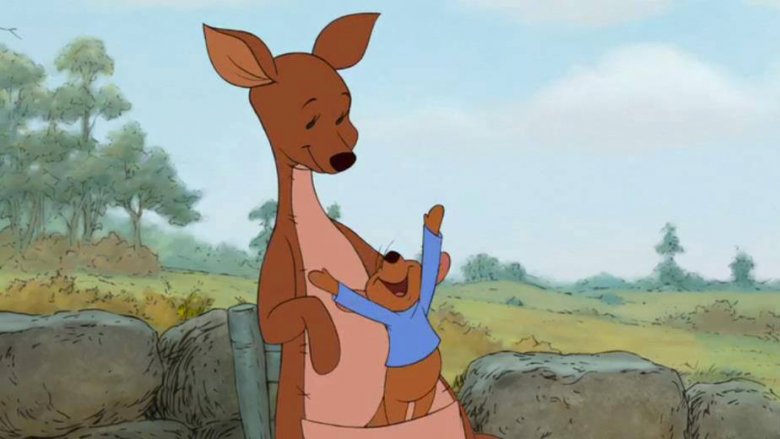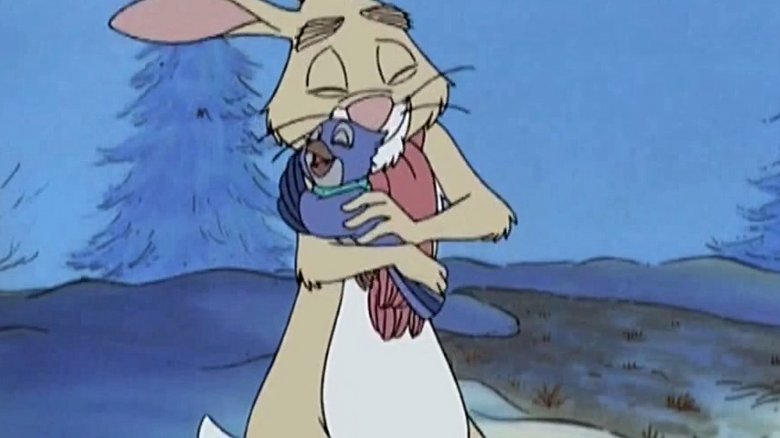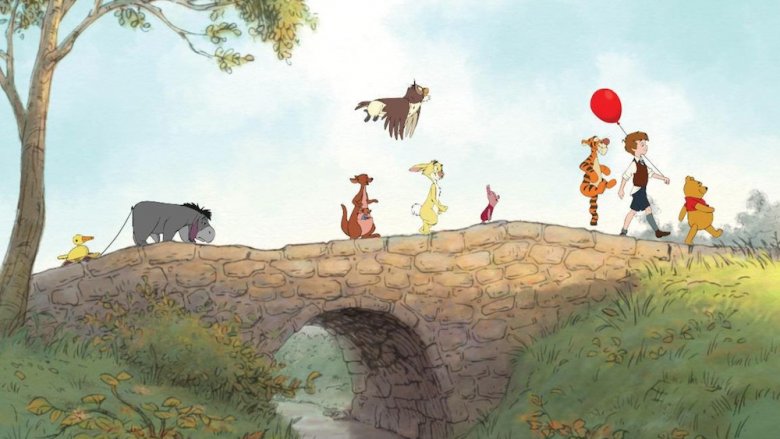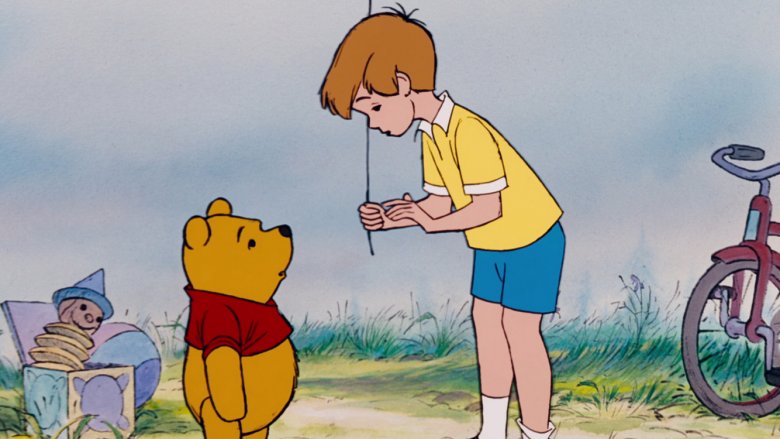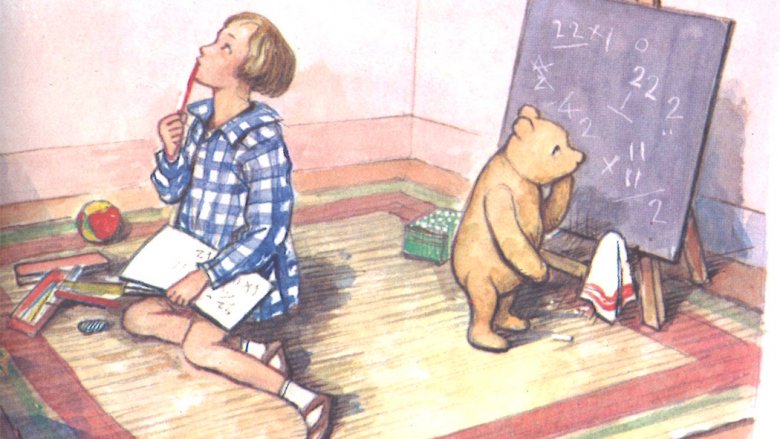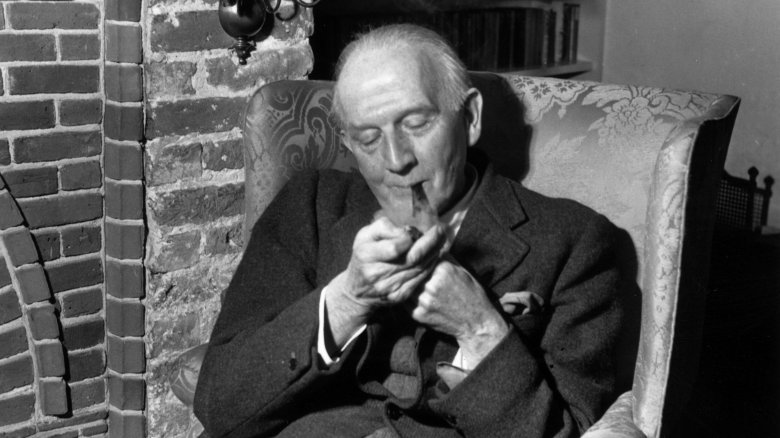Messed Up Things In Winnie The Pooh Everyone Ignores
For almost a century, Winnie the Pooh and his fuzzy, adorable friends have entertained and inspired both children and adults alike. Part of their enduring charm is that, unlike a lot of awesome children's entertainment, the Winnie the Pooh universe (or the Poohniverse for all you superfans), comes across as completely and totally innocent. There are few, if any, secretly dirty jokes, nobody ever gets violent, and even when part of the Kingdom Hearts series, the evil Heartless never once invade the Hundred Acre Wood. Pooh and friends are so far removed from darkness, they make the Jedi look like Nazis.
...or so it seems. If you think about it, there's a lot about the Hundred Acre Wood that Disney would rather you not dwell upon, and it's not just how the name "Pooh Sticks" sounds absolutely disgusting. Here are some other messed-up details about the silly old bear's world you probably didn't notice.
Pooh should be beyond obese, given how much he eats
The most famous member of the Winnie the Pooh world is, of course, Winnie the Pooh. It's impossible not to love his endless optimism, his chubby little body, and his adorably failed attempts to think things over. It is, however, completely possible to realize that, in any world aside from Pooh's, the bear of very little brains would also be a bear of very much gut.
Look at how much food Pooh eats. It's more than just a smackerel here, or a drop for his rumbly-tumbly there. Pooh gorges himself on honey seemingly all day long, which isn't the keenest of dietary plans. Sure, honey is fat-free, but it's all sugar and Pooh gobbles down gallons of the sweet stuff at a time. And that's not including all the cake, bread, and other high-calorie fatty foods he consumes in between honey pots. Any realistic interpretation of Pooh would conclude he should be absolutely enormous.
He doesn't exercise much either, making things far worse. Yes, he goes on plenty of walks throughout the Hundred Acre Wood, but they're usually casual, leisurely strolls. It's the kind of walking that doesn't burn calories so much as gives them a pleasantly warm sunbeam to nap in. Pooh should be literally exploding, rather than simply humorously splitting his butt-fur every so often.
The Wood needs a doctor for everyone's mental health
From childhood on, we've had very little reason to think Pooh and friends were anything other than balanced and righteous. Sure, they might get a little silly sometimes, and none of them are the smartest stuffies in the toy store, but that doesn't mean any of them are battling serious issues, right?
Wrong. It might not be comfortable to say, but a good number of the Hundred Acre Wood populace are likely taking on some severe mental health issues. Probably the most obvious is Eeyore, who's been bitterly battling chronic depression from Day One. He has a pretty decent life, friends who love him, and no need to worry about money. But he's still depressed, because unfortunately that's just how depression works.
Then there are Rabbit and Piglet, who both display signs of extreme anxiety and nervousness. Tigger, meanwhile, is basically a textbook histrionic, constantly desperate for attention. Owl is clearly suffering from delusions of grandeur, as he considers himself a wise, well-read genius, but he can barely spell.
Finally, there's good old Pooh, a binge eater if ever there was one. The only real question is, what drives him to eat this way? Does he feel inadequate? Or perhaps it's actually physical, and he's had a tapeworm all this time. Either way, Christopher Robin should stop hanging around Doc McStuffins and find a good stuffed-animal psychologist instead.
What happened to all the other Tiggers?
Aside from Pooh, perhaps no resident of the Wood is more beloved and famous than Tigger. But if you think about the endlessly bouncing ball of energy's backstory a bit, you might just lose all the bounce in your soul.
Despite constantly referring to Tiggers in the plural form, his is very much a singular species. He comes right out and says in his theme song that he's "the only one." This proves he's not just a tiger who can't spell, but that he's his own animal, and he's more alone than we could ever dream.
What happened to all the other Tiggers? Did they accidentally bounce off high cliffs? Were they poached, like too many real tigers? And of all the Tiggers to survive until the end, how did this gentle, devil-may-care, harebrained one pull it off? Don't expect Disney to answer these questions.
Disney hammers the "one lonely Tigger" point home in A Tigger Movie, where the stripey load of fun-fun-fun-fun-fun goes searching for literally any other Tiggers in the world. Ultimately, he finds nothing but the Hundred Acre Wood gang dressed as Tiggers. It's the usual kids' movie moral about how your friends are your real family, but it still has to be a heavy anchor in one's heart to know there's nobody else like you in the world. The Panthera tiggeris species is, sadly, one faulty bounce away from joining the dodo and the dinosaurs.
Where is Roo's dad?
For a world seemingly created entirely through the power of a child's mind, it's funny that aside from Christopher Robin, the Hundred Acre Wood contains only one actual child. That would be Roo, the adorably bouncing son of Kanga. Roo works great as an avatar for those watching and reading who don't see themselves wearing socks quite as high as Christopher Robin, but the whole mother/son thing gets weirder once you do a little research.
Roo has a mom, but you never see his dad. It can't just be because mom and son already claimed every syllable in "kangaroo." So what happened to him. Is he dead? Did he abandon his son and wife? Perhaps Roo is the product of marsupial Immaculate Conception? Neither A.A. Milne nor Disney ever gave us an explanation, but you might get some hints if you turn to real-life animal studies.
See, kangaroos don't mate for life, and the males certainly aren't monogamous. They actually live in packs called mobs, where the oldest and largest male goes around mating with all the women. Running with that, Roo never would have had a chance to meet his father because that cad simply hopped up to Kanga one day, gave her a special hug, and then hopped off to find more hugging partners. So never mind that mister — it would be more realistic for Roo to get a movie where he goes in search of his many, many half-brothers and sisters.
When Rabbit adopted a bird and treated it like a baby
Imagine bringing home a puppy and instead of putting food in a bowl and newspapers on the floor you treated it exactly like a human infant. That would be pretty weird, wouldn't it? Well, a similar thing happened in the Wood.
In the first season of the late '80s series The New Adventures of Winnie the Pooh, Rabbit stumbles upon an abandoned baby bird. Because he has such a big heart, he takes the bird, named her Kessie, and nurses her to health. Because he has such a ridiculous brain, Rabbit treats her not as a pet but as an actual baby. He warms up bottles for her, changes her diapers, puts her down for naps, and does all the other stuff parents are supposed to do, but not pet owners.
To further the narrative that Rabbit doesn't know the difference between pets and babies, a later episode has Kessie returning as an adult bird. Rabbit, still oblivious to what's wrong with his line of thinking, continues to treat her like a baby. His attempts to put what's essentially a teenager down for an afternoon nap goes as well as you'd expect. At the end of the episode, he finally accepts that she's a grown-up now but never seems to realize that virtually every move made from finding Kessie on was both unnecessary and weird.
Is the Hundred Acre Wood real or not?
Obviously, to us, everything about the Hundred Acre Wood is a made-up product of the books, cartoons, and movies we consume. But within that fictional world, there's legitimate confusion as to whether Christopher Robin made everything up.
In the original books, it's clear Pooh and the gang are figments of Christopher Robin's imagination. But since then, Disney's flip-flopped on the reality. In an episode of The New Adventures of Winnie the Pooh, for example, Christopher Robin goes to the theater and his animal friends tag along. They cause an actual ruckus that results in a life-size cutout toppling over and Christopher Robin spilling snacks everywhere. Either he's the clumsiest boy on the planet, or his friends are real and they did that.
Then in 2001, The Book of Pooh showed the gang as stuffed animals, sending them straight back to the Imagination Station. Later, 2007 brought us My Friends Tigger and Pooh, where a girl named Darby could interact with Pooh and folks, alongside Christopher Robin. So ... real again? Now we have the movie Christopher Robin, featuring the titular boy all grown up and lacking imagination. This should mean Pooh and company cease to exist, except they all appear in an attempt to help Christopher rediscover his inner child.
So they might be real, and they might not be. Either way, if you see a bear coming toward you, run away. It's probably not Pooh, and it's probably not friendly.
Disney's Christopher Robin doesn't seem too smart
Let's run with the idea that everything Pooh and company does is make-believe. If that's the case, then something is wrong with Christopher Robin's intellectual development, and nobody's talking about it.
In the original books, Christopher was essentially a toddler, only going to boarding school at the end of the second book. This isn't really the case, however with Disney's version, who looks like he's about 8 or 9 years old. So he's probably in third or fourth grade and has had some education. Why, then, does he make so many basic spelling and logical errors he should have grown out of by now?
If the Hundred Acre Wood residents are all imaginary, then everything they do comes from Christopher Robin's head. Every time a character misspells something basic, like "honey" as "hunny" or "school" as "skull," that isn't just Pooh having very little brain. In all likelihood, that's how Christopher Robin thinks it's spelled. That's to say nothing of logical leaps that few kids his age should stumble into, like not recognizing Tigger without his stripes. It might have looked better if Disney made him 4 years old because then his academic confusion would at least make sense.
Then again, this is the same kid who, no matter what age, wisely told Pooh, "You're braver than you believe, and stronger than you seem, and smarter than you think." So maybe he's street-smart rather than book-smart.
The real Christopher Robin hated his legacy
You're probably aware that Christopher Robin was a real person. He was A.A. Milne's son, and all the Pooh stories were based on him and his stuffed animals. What you might not be aware of, however, is that for a good chunk of his life, the real Christopher Robin absolutely hated Pooh and everything to do with him.
As told by his friend Gyles Brandreth, Christopher Robin quite enjoyed being a household name for the first few years of his life. But then he went to school and the bullying began. Because children are quite good at finding anything to tease each other about, they constantly picked on Christopher for being the Pooh kid. It probably didn't help that his mother dressed him not in the boys fashion of the times, but rather in the gentle, feminine manner his fictional counterpart sported in the books. That, plus a growing realization that his emotionally distant father had made a fortune using his own son's name, fostered a resentment toward his fame that lasted years, if not decades.
By the end of his life, Christopher Robin softened his stance and grew to not only appreciate, but even enjoy the Pooh books. If that's not proof that the chubby little cubby can warm any heart given enough time, nothing is.
A.A. Milne hated Pooh upstaging his other works
If you thought Christopher Robin hating Pooh Bear was a shock, prepare for an even bigger blow to your childhood. A.A. Milne also hated the silly old bear. Christopher was his father's son after all.
According to Gyles Brandreth, Milne certainly amassed a fortune from his Pooh books, but it didn't seem to make him happy in the least. That's because A.A. Milne was actually a highly prolific writer, crafting many plays, novels, and other serious works. But no matter how good they were, the public largely didn't care about Milne until Winnie the Pooh came along. The bear's exploits in the Hundred Acre Wood won everyone over, but their love didn't extend to the rest of Milne's work. He kept on writing books and plays, but all anyone cared about was Pooh. Milne apparently hated how his reputation rested entirely on the shoulders of his silliest, lightest work, and he grew to resent poor old Pooh as a result.
In addition, Milne hated how getting famous for writing children's books made a lot of people think he loved children. In truth, he barely tolerated them and openly admitted he wasn't "in the least sentimental about them." It's certainly sobering to realize that, when A.A. Milne wrote "Some people care too much. I think it's called love," he believed it about as much as he believed the Hundred Acre Wood was real.
